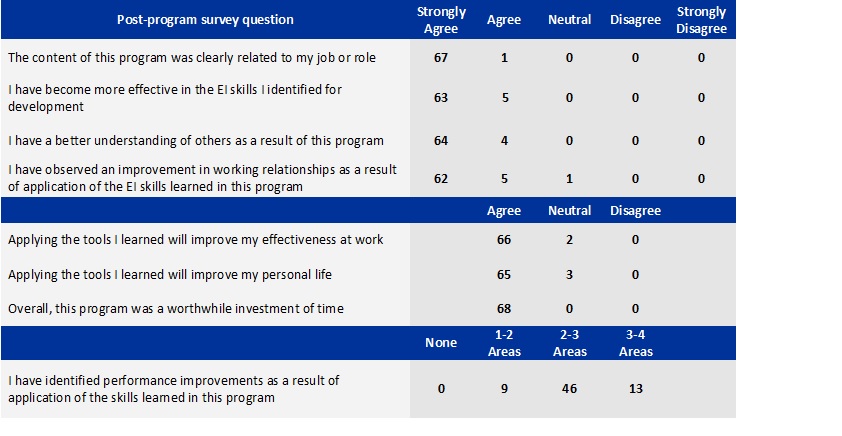Client’s Objectives:
- Provide the Leadership Team of Vice Presidents and Directors with new tools that will build proficiency in selected competencies of emotional intelligence which are integral to the organization’s new Leadership Competency Model.
- Improve capacity of leaders to mobilize talent, motivate and influence high performance, innovate, and develop strategic partnerships across the organization and customer base.
- Improve leadership effectiveness during organizational change.
- Improve agility in response to frequently changing market environment.
- Improve communication effectiveness and listening skills.
- Improve resilience and reduce effects of stress.
- Improve collaboration and teamwork.
- Strengthen trust.
- Build Director-level leadership capacity.
Program Format: Level 4 – Leadership Effectiveness with Emotional Intelligence Competence
Divisional leadership groups. Vice Presidents, Directors, Managers consisting of 4 groups; n68
Impact – Overall measurably positive results on multiple individual and team behavioral and performance measures.
Sponsoring Vice President described observable improvements in leadership effectiveness, team effectiveness and specific leadership competence in the team members with whom the VP had frequent contact. Written and verbal reports from participants themselves describe individual examples of improvements and state they have observed specific behavioral improvements in fellow team members.
Post-program Surveys – Post-program surveys ask a series of questions to obtain qualitative and quantitative impact measurements. Extracts of selected post-program measurements are shown below. Data collected 45 – 60 days post program.
The majority reported improvements in these key capacities:
- Increased trust
- Increased teamwork and collaboration
- Improved communication effectiveness with co-workers and their direct-report teams
- Expanded understanding of one another
- Improved relationships with direct report teams
- Improved focus
- Improved agility and ability to respond effectively to change
- Improved coping under pressure
- Increased patience with others to more effectively influence
- Reduction of physical stress symptoms
Verbatim responses to post-program qualitative survey questions:
What benefits or improvements have you experienced? What are you observing about yourself, your behavior, or your interactions with others that indicates you have made progress with the goals you selected at the start of this program?
- Self-regulation of emotions and communication: The training has made me aware of some of my communication problems. I’ve been able to make much progress at home and am beginning to do better at work. I’m having some difficult moments with my manager and I’ve been able to use the tools sometimes to remain calm. I’ve noticed a considerable improvement in our relationship since the training, but still more work to do. One of my problems is that my mind is always going 200 mph and I need to slow down to be more effective. With goal #11 (improve control of my reactions) I’ve made progress.
- Increased rational vs. emotional response: Overall, I’m seeing that I’m much more rational and less emotional. There have been 3 specific situations where I changed my approach for the better, after applying these tools we’ve learned. It’s been very helpful for me to step back and realize where I am making assumptions without basis. An important goal for me is #27 (improve ability to listen effectively to viewpoints of others with whom I disagree). I am listening better in these situations and trying to understand the background of the other person’s POV.
- Prioritization and delegation: Goal #33 (Improve effectiveness in delegation) has improved for me. I used to get involved with situations and handle them because I “could” instead of whether I “should”. Now, I am able to step aside and let other departmental functions handle it, resulting in a better allocation of resources. I feel I’m more in control of getting the things I’m responsible for done and my time is now spent in more valuable areas. This is part of goal #19 too (effective prioritization)
- Focused listening: I am much more focused on listening now, and confirming what I’ve heard. Because my manager previously took this training, he has been able to coach me on using the Intuitive Listening tool and it feels good that we can “speak the same language.”
- Approachability: The biggest impact for me so far has been my goal #10 (Improve my ability to demonstrate a behavior style that is approachable and engenders trust). I’m now being fully attentive when people come into my office; I’m more aware of not typing on the keyboard when talking to people that come in or on the phone. This is resulting in less follow-up later – I’m getting more info up front.
- Delegation and motiving others: I’m trying to focus on two specific goals: #33 (Improve my effectiveness in delegation) and #36 (Improve my ability to motivate others). I’m feeling good about the progress with both. I’m feeling stronger and more confident; I’m communicating more and doing better at pushing back when appropriate. As far as encouraging others, I’ve become more patient with people, especially in listening. Now I have less tendency to have to “be right”, and I give the other person the time to explain instead of focusing on proving my point.
- Re-focus and re-prioritize time management: I can now stop and evaluate during the day. If I stop and use Freeze-Frame and evaluate the first part of the day I see if I need to change direction for the second half of the day. I know this sounds like common sense, but the pace around here is so hectic and fast-paced that it’s not typical to just stop and reevaluate what we’re doing. The tools make this more practical.
- Self-confidence and proactivity: I’m taking more initiative, which indicates progress on my goal #9 (increased feelings of self-assuredness; exhibit self-confidence). I still feel the hesitation at first, which I guess is uncertainty, self-doubt or fear of some kind, but I’m able to apply the tools and move forward.
- Health, stress and improved connection with direct leader: Something interesting happened. Prior to this training, I had been having health problems due to the stress load, but feeling hesitate about approaching my manager to discuss them – not sure how to communicate it well and how it would be received. I love my job and I’m not one to complain about “too much work.” Finally, I’ve met w/my manager who was so very focused and listened empathetically. I felt very good and feel we connected at a new level. Another significant impact has been in the relationship w/one of our agencies and how we are communicating with them using the Skillful Discussion tools and Intuitive Listening, while at the same time managing Overcare.
- Reduced stress and blood pressure: I must tell you that I was a real skeptic when I heard you say that these tools can help some people with reducing blood pressure. Mine is measured two – three times a week and well, it is down. I think this is because I’m using the tools to remain calm in spite of high stress demands at work. Also, I have a tendency to be a bit sarcastic, it can be humorous, but I realize that it was becoming unprofessional and that I should modify this for my career growth. I’m making progress using several of the tools.
Pre – Post program
The POQA-r is a normed self-report assessment consisting of 85 questions designed to measure key elements of personal and organizational quality, and key factors of organizational climate. Of primary consideration are the employees’ self-management competencies (foundational Emotional Intelligence competence), which interact with the organizational climate to influence and affect individual or personal quality. This, in turn, affects Organizational Quality indicators such as employee satisfaction, engagement and work effort, which produce important organizational performance outcomes such as customer satisfaction and profitability.
Pre and Post-program scores of participant responses were compared to a reference group consisting of over 5,900 responses from a variety of Fortune 500 companies and public sector organizations representing a diverse sample according to age, gender and job level.
POQA composite of Vice Presidents, Directors, Managers (n68):


Sub-group: Leadership Team of Regional Vice Presidents and Shared Services Directors (n14)
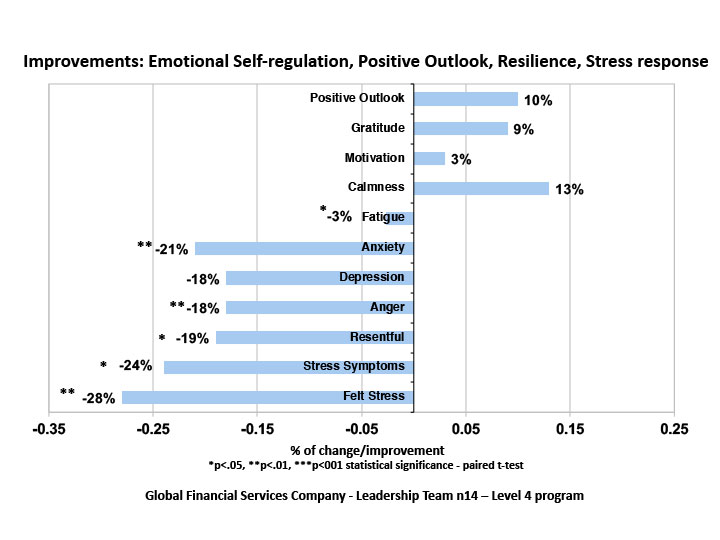
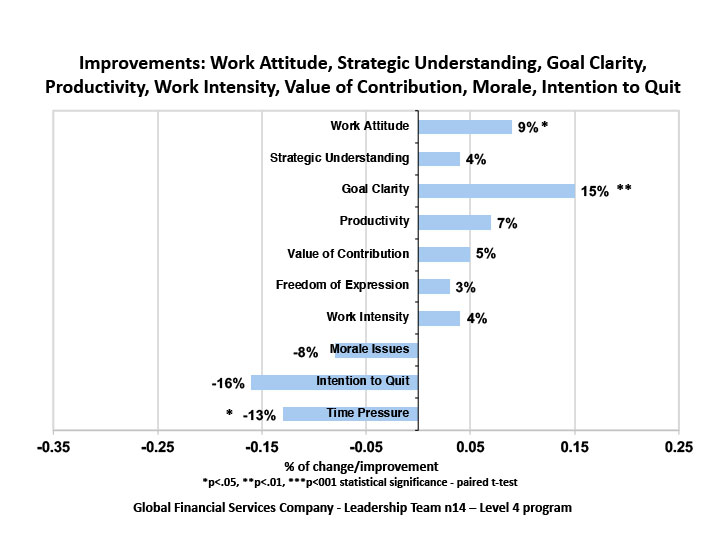
Sub-group: Leadership Team of Regional Division (EMEA-APAC) – (n12)
Pulse Survey –
The Leadership Team for the EMEA-APAC region scored itself on 21 measures that were identified for strengthening pre-program, using a 10 point scale. The team’s post-program scores reflect observed improvement on 21 of 21 measures, with 12 scoring in the most desirable range of 7.0 or higher, shown below. Note: items 18 – 21 are reverse items with scores below 5.5 being most desirable.
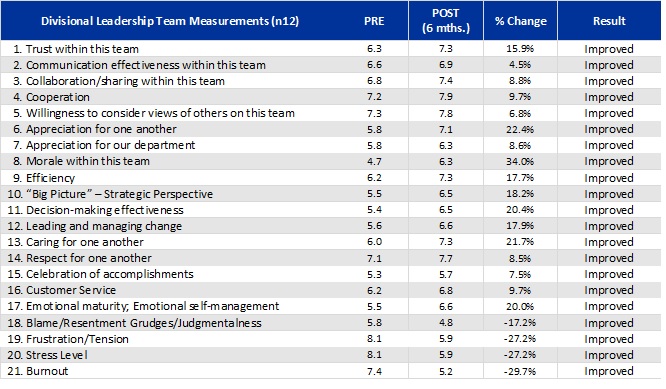
Post-program Qualitative Survey of Leadership Team of Vice Presidents and Shared Services Directors (n14) – extract
Verbatim responses to post-program qualitative survey questions:
What benefits or improvements have you experienced? What are you observing about yourself, your behavior, or your interactions with others that indicates you have made progress with the goals you selected at the start of this program?
- Concentration and listening: I’m able to concentrate more directly on the things I need to do without being overwhelmed or stressed. This has helped in my interactions with my team; specifically, I’m taking more time to listen more to them. One person came to me and said he noticed a change over the last 3 meetings. In turn, I see that their communication is improving and speeding up the process on a critical business project. Just by listening to the “way” a person expressed something enabled me to give a recommendation that I don’t think I would have caught in the past.
- Effectiveness under pressure: I have to tell you about how Freeze-Frame and Intuitive listening helped me recently in a very high stress situation that has business relevance. What happened was [redacted]. This was extremely challenging, frustrating and I was under a great deal of pressure. In the face-to-face meeting, I stayed calm and didn’t just give up on it. The result is that although it’s not finalized yet, I kept it moving forward. In the past I would have given up at that point.
- Calmness for effective leadership and focus: I am much more calm. I don’t get agitated as easy. This is impacting some of the managers that report to me, so they in turn calm down when there is a problem. I’ve noticed more conversations where I’m not getting defensive. For heavy-duty meetings I’m preparing myself before I walk in to set a better tone. I’m finding Freeze-Frame to be a very valuable tool for me.
- Understanding of others and effective listening: For my goal #22 (Empathy, Improved understanding of others and their needs) my goal was for people to no longer perceive me as inflexible. I have greater awareness on this now. I’ve used intuitive listening and it has helped. For goal #30 (improve my daily communication clarity & effectiveness) I am also using the listening tool and it’s helping.
- Emotional self-regulation and listening: Goals #9, #11 and #19 are very important to me (9-increased feelings of self-assuredness; exhibit self-confidence and authentic presence; 11-improved control of my reactions to specific triggers; 19-improved effectiveness in prioritizing), and I’m glad to report I’m seeing good progress. I’m much more relaxed and calm when trying to discuss things with people when in the past I would become short-tempered and impatient. I’m listening more and staying calmer during triggers in conversations.
- Improved focus and prioritization: I notice I’m able to get out of the feelings of turmoil much faster and re-focus. I’m being more centered more often.
I’ve become better at saying no and removing myself from activities that are not a priority.
I am focusing more on higher impact items. - Improved awareness and self-control: I’m finding this course to be fantastic. The scientific background makes a difference for me in learning this and awareness. I notice I have higher awareness of my choices “in the moment” and I’m opting to use my level 3 bring more often. This week, during a meeting with Tom, as he challenged me, I used Freeze-Frame and it didn’t get to me. I didn’t lose my focus and become too nervous. I did very well.
Satisfaction and relevance of application – final participant survey extract
Leadership Team of Vice Presidents and Shared Services Directors (n14)
A final participant survey was administered to gather anonymous feedback on participant satisfaction and perceived relevance of application to their job or role. Responses indicate a high degree of satisfaction with the program’s relevance and application to both workplace and personal life.
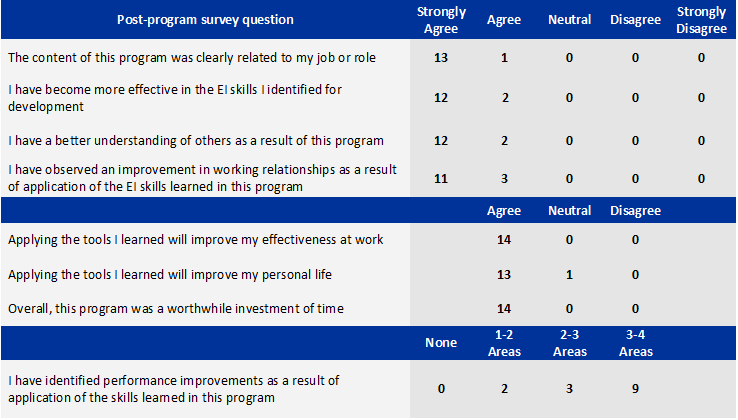
All 4 Leadership Groups
The following table presents elements from the post-program POQA-r assessment for the four leadership groups (n68). Post-program percentage of responses of “Agree” or “Strongly Agree” for each question reflect improvements on the majority of key measures.
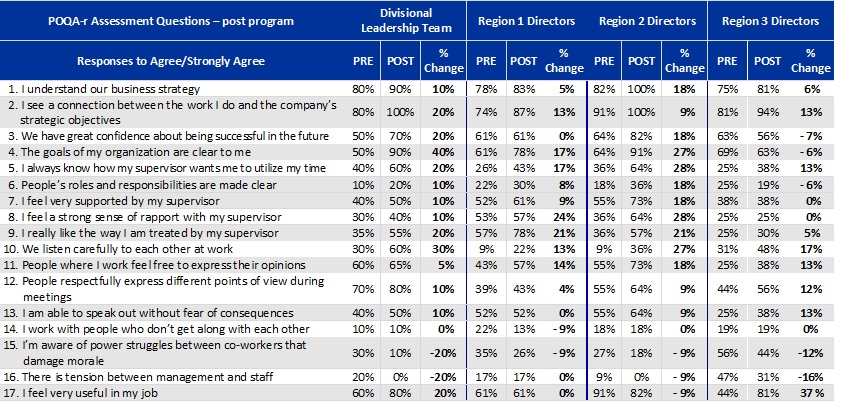
Satisfaction and relevance of application – final participant survey extract
Composite of all 4 leadership groups
A final participant survey was administered to gather anonymous feedback on participant satisfaction and perceived relevance of application to their job or role. Responses indicate a high degree of satisfaction with the program’s relevance and application to both workplace and personal life.
